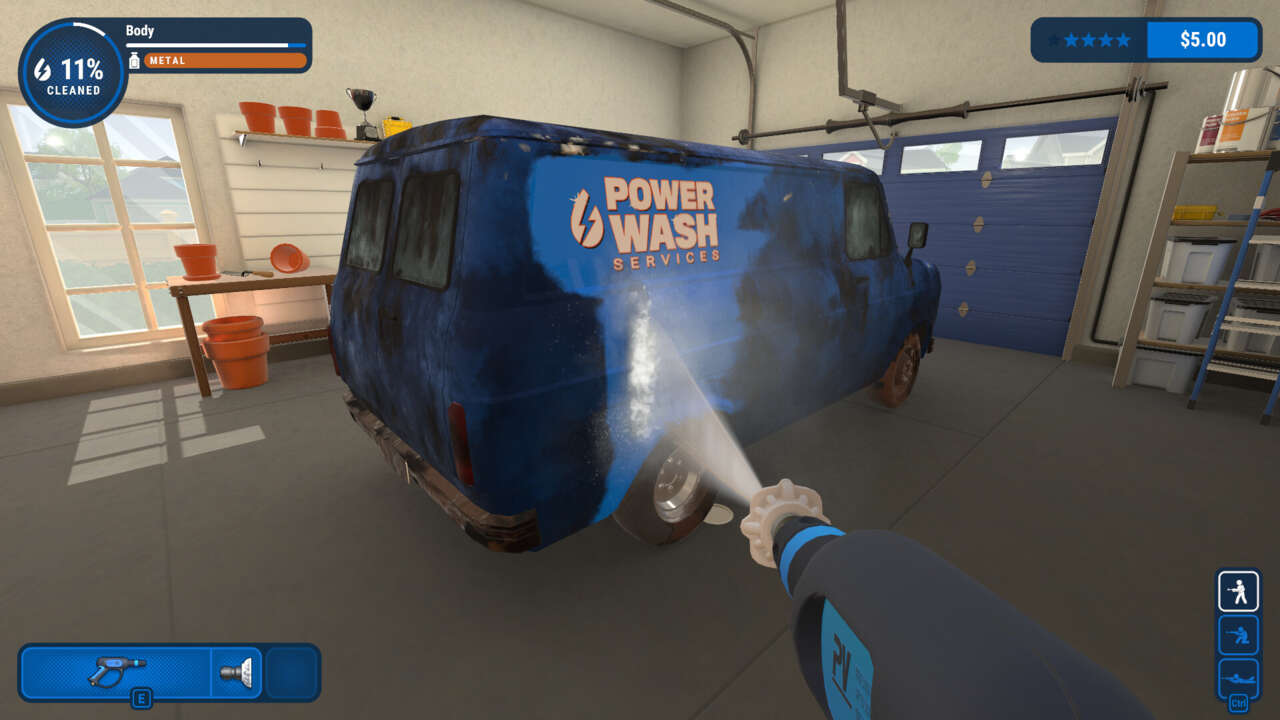A cursory Google search of the term “job simulator” would show the 2016 VR game Job Simulator as the top result. But it is not representative of the plethora of simulation games answering the question: Can a job be fun?
From Microsoft Flight Simulator to Overcooked, the workplace has been a subject by game developers for a long time. Yet in the last few years, there has been a considerable explosion in their exposure. Likely in part from marketing strategies using Tiktok or Twitch, it has become common to find content creators role-playing as cashiers or managers, further drawing intrigue as to how these non-traditional games have garnered such popularity.
PowerWash Simulator surprised many (myself included) when its zen-focused cleaning mechanics soared in sales and popularity. Lead designer Nick McCarthy told me via email, though, that while satisfying cleaning is central to the game’s identity as a type of “anti-first person shooter,” the team did consider adding business-focused elements.
“Early on during development, we had explored more in-depth business management mechanics. But as the washing mechanics came together, we realised just how satisfying it was to clean stuff,” McCarthy said. “It became clear that PowerWash Simulator was best expressed as a zen, satisfying, no-frills experience that allowed players to just remain focused on the washing, without any of the stress and obligations accompanied with keeping a business running.”
To McCarthy’s point, finding the fun is in analyzing the workload and figuring out how to efficiently complete the job. This comes as a slight relief for those wanting to unwind and gradually work towards a completion state. With no concerns about logistics–such as buying or maintaining equipment, finding clients, and expanding your business–nor needing to earn a profit, the primary incentive of play is to finish a job as efficiently as possible.
“I’ve seen some hilarious examples of streamers/YouTubers playing together–some engaging in the chaos of blasting each other with the pressure washers, and/or leaving messages and artworks in the dirt and waiting for others to find [them],” McCarthy said. “Others use it as a wholesome means to just connect, chat, and chill out together. It’s also been great to see our community engage with each other to help finish jobs. Some of our jobs are quite large and can take many hours to finish, so understandably, a player will occasionally put the call out on Reddit or the PWS Discord, asking for someone to come help. It’s both heartwarming and amusing to imagine that a shared desire to destroy all visible dirt and grime could help to forge some friendships out there.”
Though it might not be surprising, a recent survey from the Pew Research Center found that about half of Americans find their jobs satisfying. A job for most is a means to an end, so long as they make enough to have a life for themselves, satisfaction is a secondary priority. However, just over 67% say they are extremely satisfied with their co-workers. What that 67% tells us is to make a job bearable is whatever camaraderie that can be mustered despite work’s soul-crushing element. Thus one explanation as to why simulation games are so appealing; you don’t have to work, you can play this for your discrete satisfaction.
PowerWash Simulator falls in the distinguished section of comfortable games that don’t cause too much stress. However, Drug Dealer Simulator 2 (yes, they made two) is as much a game about selling narcotics as it is managing time and expanding a business. When I asked lead developer Rafal Pęcherzewski how he feels about job simulators, he wrote back to me with pragmatism.
“If we boil down what makes them stand out as a medium, video games are basically different types of puzzles and challenges,” Pęcherzewski said. “Some are intellectually challenging; some are skill-based, challenging our reflexes and ability to adapt, learn, and react. Most jobs in the real world could be characterized in a similar manner–tasks, challenges, solving problems, and providing different kinds of activities. Job simulation games are only the area where we draw the arbitrary line to separate them from the rest [of games].”
Simulation games are in the unique position to tailor player experiences to whatever job or scenario they are interested in simulating. There are as many games that can be made as there are real-life occupations that can be adapted into a game: airplane pilot, drug dealer, chef, cashier, document inspector, mortician, zookeeper… the list is endless. Furthermore, there are the different levels of complexity a developer can work with.
For example, farming as an occupation requires dozens of hands, so games have taken to adapting farming through a range of styles. Where Farmville is primarily concerned with agriculture management and social media interactions, Farming Simulator strives to depict a vivid representation of farming, from equipment procedures to simulating a fluctuating economy. Ranch Simulator simplifies farming techniques but requires active care of animals and vegetation. Even in games that aren’t simulators, such as Stardew Valley and Harvest Moon, players can live out a cozy farming lifestyle apropos to Animal Crossing.
A growing number of publishers have started specializing in simulation games, like Astragon Entertainment, Excalibur Games, Movie Games, and PlayWay. Their catalogs are wide and highly specific in what they simulate, but they are evidence of a demand for niche job simulators and the effect they have on those who play them.
After exchanging emails with Yvonne Lukanowski of Astragon, it began to dawn on me the certain escapism found when diving into the simulation. Yet, I was surprised to learn that many who play simulation games gravitate towards the ones that simulate their real-life jobs.
“People are drawn to simulation games for several reasons,” Lukanowski said. “Many of our players work in the professions we simulate, such as firefighters, bus drivers, construction workers, and police officers. They enjoy performing familiar tasks and exploring aspects of their jobs that they might not experience daily, like using different vehicles or handling varied scenarios. Fans of action, competitive, or RPG games occasionally play simulation games to relax and clear their minds. The slower pace and methodical gameplay provide a refreshing break from more intense genres, making simulation games appealing to a broad audience.”
Some of the most fascinating games, however, are the ones that don’t seem exciting in nature. Though Grocery Store Simulator and Police Simulator might seem vastly different from one another, they are tangentially related in that they can be as thrilling as one would like. The former could be a roleplay experiment in which players can test how expensive a can of soup can be before NPCs will refuse to buy it, while the latter can mimic mundane work’s ability to drive an obsession over counting down minutes until a shift’s end.
But just because these are monotonous activities doesn’t mean they aren’t fun. “From my experience, ‘boring’ is a very subjective thing to define,” Pęcherzewski continues. “I know people who call Tarantino movies boring, dull, and ‘talked through,’ which I strongly disagree with, but I understand where they’re coming from. People find very different kinds of tasks engaging and others frustrating or boring. We have people who love to spend 12 hours straight fishing on a peaceful lake, others parachute jumping, and [others] all the way in between. Additionally, some people have lives filled with thrilling, problem-solving, [and] complex or challenging tasks, and chilling around a garden, doing some satisfying but repetitive tasks and earning a few points, it’s what they are looking for as a refuge after a hard and stressful day. Games are simply a simulated way of spending time and people will seek all sorts of emotions and experiences in their realm.”
Having a job, as the name implies, is work, and sometimes that work scratches a perfect itch to be organized and demonstrate power. And yet, various socioeconomic realities can impede any fun factors or meaningful personal expression. The surging middle market for job simulation games makes sense when contextualized against the anxious fixation people have regarding labor. Developers, publishers, players, and even critics are worrying if a viable future is still in reach on the route we are headed. Job simulation games are proof of that.









